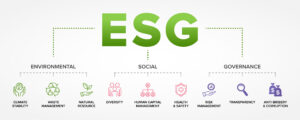A new Morningstar survey indicates that 90% of companies are developing an environmental, social, and governance (ESG) strategy. But when you look at the largest companies in the energy and utility industries, 100% of them are intensely focused on ESG due to the environmental impact of their operations and the value it provides their customers, partners, employees, and shareholders.
More and more investors are favoring companies that have an active ESG model. In fact, upwards of ¼ of global investors say ESG is central to their investment approach (Harvard Law). This is only going to increase as time goes on. But it’s not just investors; consumers are looking to brands to have a heightened ESG approach. Their impact on these factors decides whether or not their consumers trust them to make the right decisions.
What is ESG?
Building an effective and meaningful ESG program requires companies to set clear goals and adopt best practices. But let’s take a step back and define ESG and why each of its elements is critical :

- E: Environmental encompasses the environmental impact your company has on the world. Everything from how much energy you utilize, your carbon footprint, the waste you produce, and more is measured here.
- S: Social addresses your impact on the community you serve. You must sustain a positive relationship with the people and institutions in which you do business. It can also include employee relations and diversity, working conditions, and health and safety.
- G: Governance is how you operate – your internal practices, how you govern, and how you meet the needs of stakeholders. It comprises tax strategy, donations, board diversity, and even if there’s any corruption in the organization.
Oftentimes, ESG elements overlap with one another. For example, you can’t be a good steward of your community without being one in the environment in which you live. And creating and acting on your ESG model has become even more critical recently – especially in the energy and utility sector.
The Value of ESG
- Attract and retain current and future investors: Your ESG model can potentially strengthen investment returns to your stakeholders. The future of energy is growing more sustainable as we speak. In addition, having a formal plan in place can help prevent any environmental issues that may occur, such as an oil spill).
- Topline revenue: A solid ESG plan can help companies land new markets and expand in current ones. It can also help you build brand recognition and loyalty. Consumers are increasingly looking at how an organization contributes to the communities it serves, whether the E, S, or G. And I can tell you from experience that it is both B2C and B2B.
- Attraction and retention of talent: In today’s world, talent is hard to come by. People don’t want to just get a paycheck; they want a company that cares. ESG initiatives can help solve that. Showing your current and future employees that you have a strategic roadmap to continuously improve the environment, community, and business is meaningful to employees.
- Cost reduction: By implementing an ESG model, companies can track their goals – granted they have the software/technology in place. Tracking waste reduction, energy usage, etc., can be performed using specialized technologies and then shown (and proven) to investors, consumers, and other stakeholders.
- Reduced legal & regulatory implications: As we all know, it’s best to get in front of the horse when it comes to anything legal. As states get increasingly progressive in their shift towards ESG regulations, it’s essential to be proactive in this space. Failing future legal regulations can result in lost revenue.
ESG initiatives are happening in every industry, but they are especially critical in the energy sector because of the environmental impact. Organizations need a clear strategy and roadmap and the right technologies to support them. At Perficient, we support some of the largest companies across oil and gas, utilities, chemicals, and renewables with strategic capabilities that revolve around data, analytics, automation, AI, tracking, reporting, and transitions to the cloud. Reach out to our experts to learn how we can help.
